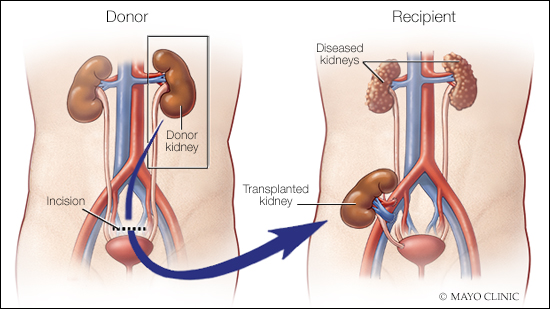-
Health & Wellness
New research shows markers in donor kidneys that could reduce risks

The donation of a kidney to a person in need of a transplant is one of the most profound gifts a person can offer. The process for living kidney donors is safe, and, at Mayo Clinic, which has one of the largest living-donor kidney transplant programs in the U.S., the process is rigorous in assessing and protecting the donor's health.
A very small number of living donors develop chronic kidney disease or low renal function years after donation, and Mayo researchers have been looking for clues to determine why this occurs. A CT scan can detect some abnormalities in the kidney prior to donation, but often it's unclear whether they're significant. Biopsies aren't routinely done prior to transplant, so in the rare cases of development of chronic kidney disease after donation, it's unclear whether it's related to the donor's preexisting condition or health changes later.
"What is reassuring is that our findings support the notion that living kidney donation is safe."
Naim Issa, M.D.
Mayo Clinic has a rich resource of kidney biopsy material in its Aging Kidney Anatomy Study, led by Andrew Rule, M.D., a Mayo Clinic nephrologist. A new study of living kidney donors at Mayo Clinic in Minnesota and Arizona from 1999 to 2018 has found some microstructural features that can indicate some long-term susceptibility for chronic kidney disease in otherwise healthy adults.
The study, published in Mayo Clinic Proceedings, reinforces that kidney donation is safe for living donors, and it provides new insights for counseling donors on how to take care of themselves and preserve kidney function, according to Naim Issa, M.D., a Mayo Clinic transplant nephrologist.
Read the rest of the article on Advancing the Science blog.
____________________________________________
Other Mayo Clinic medical research websites:
- Research at Mayo Clinic
- Discovery’s Edge
- Advancing the Science
- Forefront
- Mayo Clinic Center for Individualized Medicine
- Center for Regenerative Medicine
- Center for the Science of Health Care Delivery
Related Articles







